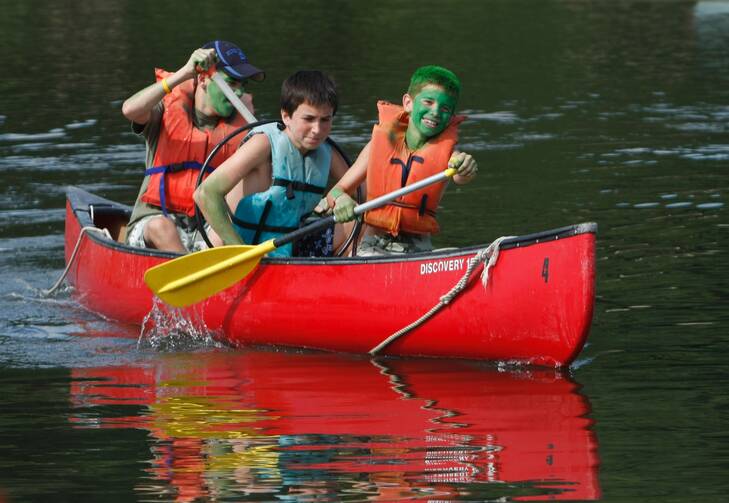As readers know, a few days ago I noted I'd be blogging about Jennifer Senior's book All Joy and No Fun: The Paradox of Modern Parenthood. I didn't want to characterize it formally as a "book club discussion," because that requires an orderliness that my brain doesn't follow very well, especially in a blogging format. I like to jump around, quote passages, and offer commentary on the issues that most galvanize my interests. I hope readers don't mind. If it looks like I need to fill in some gaps—or if readers need gaps filled—I will.
Having said that, I want to jump into the middle of the book, to chapter 4, which Senior titles "Concerted Cultivation." This, for me (as an educator), was probably the most arresting part of the book, and I found myself nodding along with most of the paragraphs. The section I want to address here is her discussion about the number of activities, and the kind of activities, for which parents sign up and schedule their children. Profiling a middle class community in suburban Houston, Senior writes:
After-school baseball isn't just Little League here. It's the right Little League team and a private batting tutor; advanced kids do club-level tournament baseball, for which "there are even tryouts," says [one mother]. "You have to be asked." Bela Karolyi, the former coach to Nadia Comaneci and Mary Lou Retton and Kerri Strug, runs a gymnastics camp sixty miles outside of Houston. Some kids start football before they can read. "Stephen went to football camp over the summer," says Monique Brown, another mother I met, "and those parents were like, 'We gotta get these kids protein shakes and muscle milk!' As if their kids were going to go pro. At seven.Summers can be even worse, because there are full days to fill. . . . Most parents know that summer camp today isn't the summer camp of yore, filled with tetherball and relay races and inedible Jell-O snacks. Camp has become a week-to-week series of immersion courses, each designed to nurture strengths and open minds. But even in light of these new, talent-optimizing developments, the recitation this woman gave of her sons' summer options was truly Homeric, amounting to a nerd's paradise for the kids but a carpool Hades for her and her husband.
Senior goes on to catalogue the variety of summer programs, which include Chemistry Camp, Space Camp and Physics Camp, as well as camps that teach Java, C++ and other skills and knowledge necessary for building apps and becoming the next Bill Gates. The especially advanced kids, notes Senior, could find summer courses in neuroscience.
What to make of all this? Senior refers to a "hyperparenting" that "reflects a new sense of confusion and anxiety about the future." In her words: "Today it is the unimpeachable conviction of the middle class that children ought to be perfected and refined in order to ready them for the world ahead." But she adds: "What, precisely, are we preparing our children for? How, as mothers and fathers, are we supposed to prepare them for it?"
Those questions are, for me, some of the most important in the chapter, and certainly ones that crop up throughout the course of a school year in conversations between faculty and families. I've seen the anxiety that Senior describes, but it's not only in the middle class. Those in the highest-income levels carry it, too. There is an intense concern with charting a roadmap for success.
All these activities, all these programs, all these camps—what is the goal? What is the end? Job preparation, career readiness, college admissions, general knowledge and sophistication, a combination of them all?
Let me add that I'm not suggesting that well-roundedness is a bad thing. I will want that for my kids one day. But Senior implies that many today are seeking more than a basic well-roundedness, more than a general dabbling. There is an effort (as Senior notes later in the chapter) to combat a fundamental uncertainty that hangs over a child's future the moment he or she is born. If we cultivate them enough, they cannot fail. If we prepare them enough, they will get into a great school: those appear to be a few of the underlying assumptions for some of the parents Senior profiles.
I could say a number of things about this issue, but the first thing that came to mind, in my capacity as an Ignatian educator, was the importance of discernment, the importance of inviting parents and students to reflect meaningfully upon the choices they are making, especially in light of their relationship with God. "Why are you doing this? What is your goal? Are your decisions driven by a fear of uncertainty?" These are some of the questions that parents and students have to ask themselves. And it has to be an institutional priority, a mission undertaken by teachers, counselors and coaches. We cannot simply usher kids into activity after activity, trusting that the accumulation of achievements and experiences will by some mystical law guide them to fulfillment and happiness. More often than not, it leads to despair and burnout.








